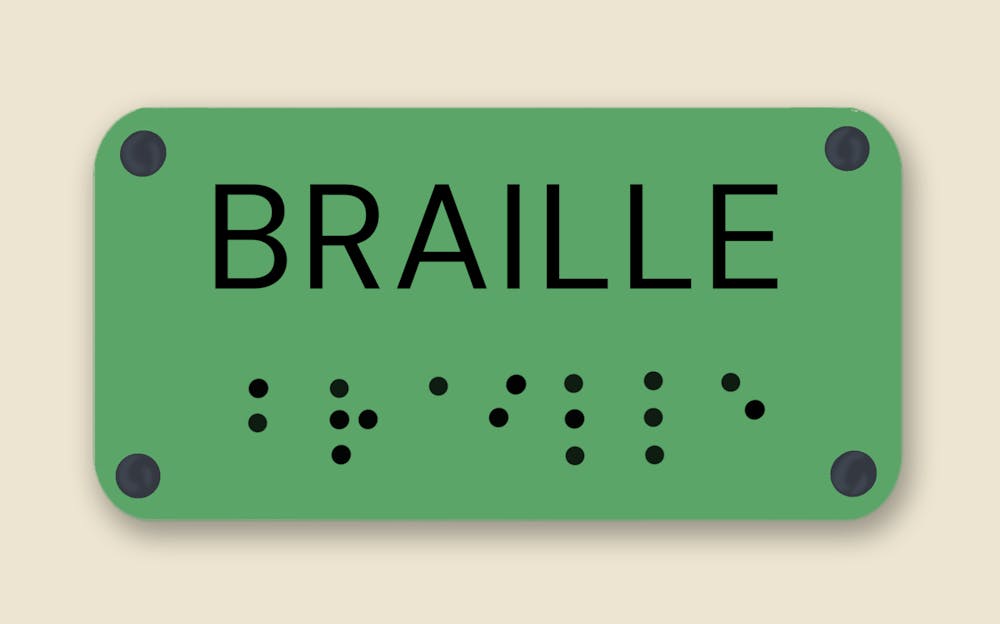Max Daugherty is a 36-year-old Gainesville resident who was declared blind on his 16th birthday.“It was the worst birthday of my life,” he said.
Daugherty was diagnosed with rod-cone-dystrophy, a degenerative disorder, at 2 years old. The condition is usually passed down genetically and the signs are seen in late childhood. He said he was the youngest person to be diagnosed with the condition after participating in a study in the late 80s.
He felt neglected in many ways while growing up in Alabama like not participating in sports and not being permitted to drive, Daugherty said.
After moving to Florida in 2006 and attending Santa Fe College, Daugherty felt more included due to North Central Florida’s available initiatives, yet work still needs to be done, he said.
North Central Florida’s disability resources are scattered across the region and are becoming more accessible to underserved communities through outreach and partnerships. Despite a majority of counties carrying low numbers of visually impaired children in comparison to their populations, counties like Putnam, Bradford and Levy are seeing larger numbers.
One active foundation is the Lions Club, an international foundation that has several branches in North Central Florida. The Turkey Creek Lions Club is a branch that serves the city of Alachua.
The Lions, founded in 1917, is best known for helping visually impaired communities, but offers its services to other disabilities as well. Through fundraisers and partnerships, the club is trying to provide more accessible initiatives for underserved, disabled communities.
Turkey Creek Lions Club President Mark Paletti was a founding member of the branch in 2004. He said there was already a Lions Club in Alachua, High Springs and Newberry, but he wanted to initiate a new one for more resources, which took its name after the Turkey Creek neighborhood in Alachua.
Paletti said having many accessible branches in the area is necessary because there is always someone who needs help, especially in rural areas.
“I’d say it's worldwide,” Paletti said. “[In] every place there’s poverty and low income.”
A large resource has been the KidSight Vision Screening program, a nationwide initiative that administers free eye exams to children.
“A lot of times, parents don’t realize that the kids have problems,” he said. “A lot of times the lower class ethnic groups don't have access to doctors or tests.”
Paletti said the Turkey Creek Lions Club has partnered with the Florida Center for the Blind, Guardian Angels Medical Service Dogs and Alliance of Therapy Dogs to assist rural, visually impaired communities.
Alliance of Therapy Dogs of Alachua tester and observer Patricia Bellis works alongside therapy dogs to observe how dogs positively or negatively pair with the routines of disabled individuals.
Bellis believes cultivating a relationship with an animal can be an effective way to build an identity beyond an individual's disability.
“The first thing that the dog does is it gives the person confidence,” she said. “The second thing is the dog and the owner have a distinctive bond.”
North Central Florida has also benefited from UF’s medical outreach.
UF’s visually impaired resources have extended across other regions. The institution’s Florida and Virgin Islands Deaf-Blind Collaborative has developed training and resources benefiting Florida’s children, young adults and families affected not only by visual impairment but deafness.
FAVI’s Family Engagement Coordinator Pam Kissoondyal said the team of five relies on collaboration from other organizations to then individualize treatment and care for children and young adults. There is also collaboration in Spanish to secure more language accessibility.
Kissoondyal said individualized treatment is crucial because the spectrum of blind and deafness can be too specific.
“It's so individualized, and there's so many syndromes,” she said. “Sometimes syndromes can really be a camouflage sort for the actual secondary diagnosis.”
UF Federal Office of Special Education Program Principal Investigator Ann-Marie Orlando believes language accessibility can be an obstacle and needs to be a priority when dealing with patients across different communities.
“Certainly a challenge is making sure that our information is disseminated in multiple languages so that we can reach people for whom English is a second language or even a third language,” she said.
Max Daugherty said he has familiarized himself with different resources offered in the region, but he believes initiatives and information can be overly complicated to navigate at times, and discourage visually impaired people from interacting with one another.
But he wanted to create his own solution, so he started his YouTube channel Blind_Prime in 2020 where he raises awareness for the disability through a more recreational, entertaining way, he said.
Being someone who has always enjoyed Transformers and Legos, Daugherty said he also felt frustrated that the instructions could be difficult for blind people.
“If I'm a blind person having trouble with Transformers, what if there's another blind person having trouble with Transformers, so let me make this,” he said.
Daugherty said the channel has helped him overcome difficult emotions from eye surgeries and daily challenges.
“I took the emotions and actually applied them [to the channel],” he said.
He said he’s found a larger passion in helping others in his own creative way.
“I try to make sure the individuals who are visually impaired in the future have an easier time of it,” Daugherty said. “We have to look out for the next generation.”
Contact Nicole Beltran at nbeltran@alligator.org. Follow her on X @nicolebeltg.
Nicole Beltran is the Spring 2025 Engagement Managing Editor and a third-year journalism and economics major. She’s worked as the Fall 2025 Senior News Director and caimán editor. In her spare time, Nicole enjoys journaling, sculpting and going for walks.






